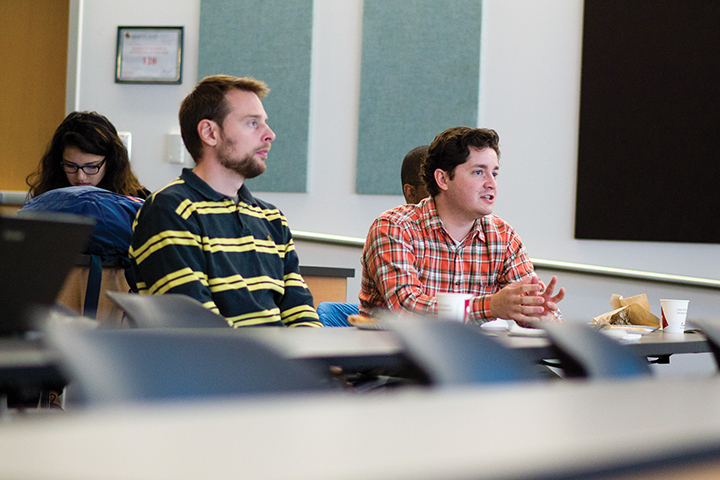University of Maryland graduate students said they want the graduate school to take on a larger advocacy role and improve its communication with students during an open forum in Tawes Hall on Wednesday.
The forum, which invited graduate students to share their thoughts about the graduate school, is part of a broader effort to review the school and provide Provost Mary Ann Rankin with recommendations moving forward.
Many of the 24 students who attended the forum said the graduate school doesn’t have a coherent chain of communication, resulting in students receiving confusing or conflicting information.
“There’s not a lot of clear communication between individual schools and the graduate school,” said Cory Ryan, a second-year public policy master’s student. “When [students are] trying to work through the admissions process, or their fellowships or assistantships, it’s not always clear who’s in charge of making those decisions.”
Graduate students would like the school to take a more centralized role in communication to help bridge the divide between departments, said Adria Schwarber, who led the forum.
“The graduate school itself doesn’t have a cohesive element … [and] that’s a problem because it does make it feel very isolating,” said Schwarber, an atmospheric and oceanic science doctoral student. “You really only have your department and your cohort to help you answer questions and guide your graduate school education.”
Moreover, many students said they would like the graduate school to advocate on their behalf for labor issues, which would promote consistency across the departments.
For example, some students said they want the graduate school to enforce statements of mutual expectations, which are documents a graduate student creates with their supervisor to outline what each expects their roles and responsibilities to be.
According to Betsy Beise, the associate provost for academic planning and programs, the graduate school strongly encourages departments to use statements of mutual expectations but does not require them. Some students said this resulted in large disparities between the quality and frequency of these statements between departments.
Other students advocated for uniform stipends. The graduate school sets a minimum stipend amount, and each department is encouraged to supplement it. However, graduate students said some departments — such as engineering and physics — can pay their students more than other departments, such as English, resulting in unequal pay for similar hours.
The Graduate School Review Committee will use the findings from this forum to create a report by Thanksgiving with recommendations for the Provost about how to improve the graduate school, said Schwarber, who is the graduate representative on the Committee.
The Committee will also use findings from other forums and meetings they have conducted with faculty, the Graduate Council and the registrar’s office, among others, said Jennifer Rice, the associate dean of graduate studies and faculty affairs.
This data may affect who is selected as the dean of the graduate school. Charles Caramello stepped down from the position in June, with Jeffrey Franke replacing him as the interim dean.
“The graduate school is at an important transition period where the provost is going to be thinking about new leadership [and] how to define that leadership,” Rice said. “This review, [Rankin] is hoping, will inform how she moves forward with that search.”
The report will be essential in finding a dean with the right background, Schwarber said.
“If a lot of graduate students in these focus groups are deciding we want better communication in the grad school, maybe that’s something we are going to want — a dean who has … a background in creating a more cohesive university environment,” Schwarber said.



